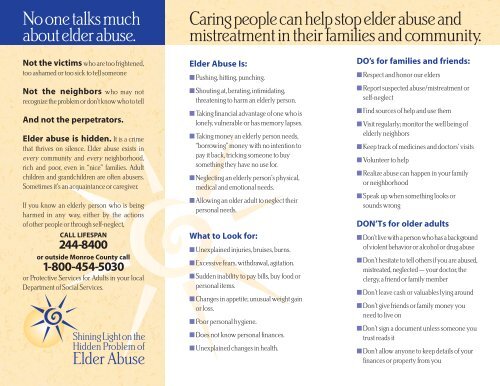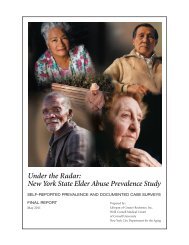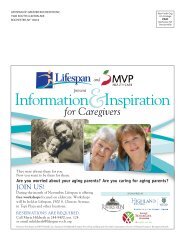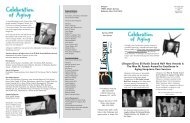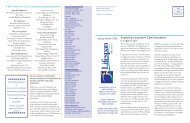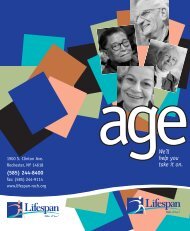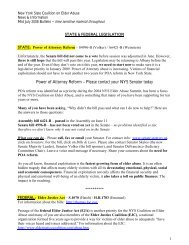Elder Abuse brochure 2003 - Lifespan
Elder Abuse brochure 2003 - Lifespan
Elder Abuse brochure 2003 - Lifespan
You also want an ePaper? Increase the reach of your titles
YUMPU automatically turns print PDFs into web optimized ePapers that Google loves.
No one talks much<br />
about elder abuse.<br />
Caring people can help stop elder abuse and<br />
mistreatment in their families and community.<br />
Not the victims who are too frightened,<br />
too ashamed or too sick to tell someone<br />
Not the neighbors who may not<br />
recognize the problem or don’t know who to tell<br />
And not the perpetrators.<br />
<strong>Elder</strong> abuse is hidden. It is a crime<br />
that thrives on silence. <strong>Elder</strong> abuse exists in<br />
every community and every neighborhood,<br />
rich and poor, even in “nice” families. Adult<br />
children and grandchildren are often abusers.<br />
Sometimes it’s an acquaintance or caregiver.<br />
If you know an elderly person who is being<br />
harmed in any way, either by the actions<br />
of other people or through self-neglect,<br />
CALL LIFESPAN<br />
244-8400<br />
or outside Monroe County call<br />
1-800-454-5030<br />
or Protective Services for Adults in your local<br />
Department of Social Services.<br />
Shining Light on the<br />
Hidden Problem of<br />
<strong>Elder</strong> <strong>Abuse</strong><br />
<strong>Elder</strong> <strong>Abuse</strong> Is:<br />
■ Pushing, hitting, punching.<br />
■ Shouting at, berating, intimidating,<br />
threatening to harm an elderly person.<br />
■ Taking financial advantage of one who is<br />
lonely, vulnerable or has memory lapses.<br />
■ Taking money an elderly person needs,<br />
“borrowing” money with no intention to<br />
pay it back, tricking someone to buy<br />
something they have no use for.<br />
■ Neglecting an elderly person’s physical,<br />
medical and emotional needs.<br />
■ Allowing an older adult to neglect their<br />
personal needs.<br />
What to Look for:<br />
■ Unexplained injuries, bruises, burns.<br />
■ Excessive fears, withdrawal, agitation.<br />
■ Sudden inability to pay bills, buy food or<br />
personal items.<br />
■ Changes in appetite; unusual weight gain<br />
or loss.<br />
■ Poor personal hygiene.<br />
■ Does not know personal finances.<br />
■ Unexplained changes in health.<br />
DO’s for families and friends:<br />
■ Respect and honor our elders<br />
■ Report suspected abuse/mistreatment or<br />
self-neglect<br />
■ Find sources of help and use them<br />
■ Visit regularly; monitor the well being of<br />
elderly neighbors<br />
■ Keep track of medicines and doctors’ visits<br />
■ Volunteer to help<br />
■ Realize abuse can happen in your family<br />
or neighborhood<br />
■ Speak up when something looks or<br />
sounds wrong<br />
DON’Ts for older adults<br />
■ Don’t live with a person who has a background<br />
of violent behavior or alcohol or drug abuse<br />
■ Don’t hesitate to tell others if you are abused,<br />
mistreated, neglected — your doctor, the<br />
clergy, a friend or family member<br />
■ Don’t leave cash or valuables lying around<br />
■ Don’t give friends or family money you<br />
need to live on<br />
■ Don’t sign a document unless someone you<br />
trust reads it<br />
■ Don’t allow anyone to keep details of your<br />
finances or property from you


